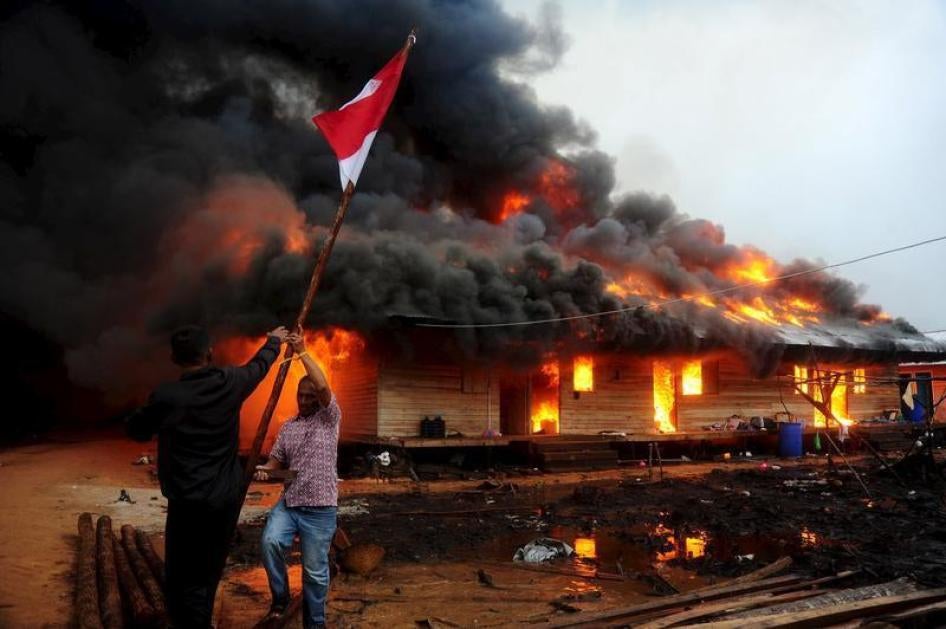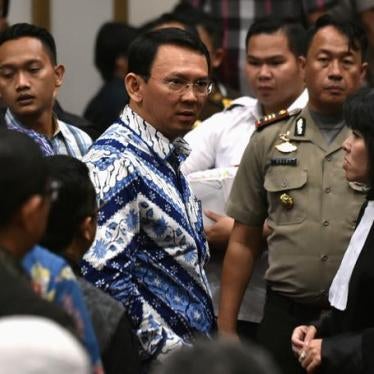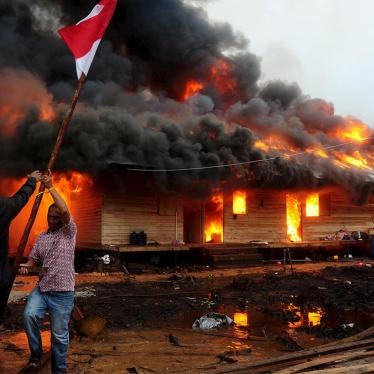(Jakarta) –The Indonesian government should scrap a draft law on the protection of religious rights that reinforces existing regulations that discriminate against religious minorities, Human Rights Watch said today.
The religious rights protection bill, which is expected to go before parliament by the end of 2017, enshrines both Indonesia’s abusive blasphemy law and decrees which restrict religious minorities seeking to construct houses of worship. The draft law also imposes excessively narrow criteria for a religion to receive state recognition, and increases the powers of the discriminatory official Religious Harmony Forums (Forum Kerukunan Umat Beragama or FKUB).
“The misnamed religious rights bill is nothing less than a repackaging of highly toxic regulations against religious minorities in Indonesia,” said Andreas Harsono, senior Indonesia researcher. “The Indonesian government should abolish discriminatory regulations, not collect them under a cynical veneer of ‘religious protections.’”
The government has sought to justify the law on the basis that “[existing] regulations guaranteeing the protection of religious rights are neither sufficient nor applicable enough to the changing landscape of the society’s legal needs.” But while religious minorities in Indonesia, the world’s most populous Muslim country, are vulnerable to discriminatory laws and official indifference to worsening intolerance by militant Islamists, the draft law compounds rather than mitigates those threats.
The draft law reinforces and expands the scope of Indonesia’s abusive 1965 blasphemy law. The law, article 156a of the Indonesian criminal code, punishes deviations from the central tenets of the six officially recognized religions with up to five years in prison. The blasphemy law has been used to prosecute and imprison members of religious minorities and traditional religions. Recent targets of the blasphemy law include three former leaders of the Gafatar religious community following the violent forced eviction of more than 7,000 members of the group from their homes on Kalimantan island in 2016, and former Jakarta Governor Basuki “Ahok” Tjahaja Purnama. The blasphemy law also has been used as the legal basis for a number of government regulations that facilitate official discrimination on the basis of religion. These include a June 2008 government decree that ordered members of the Ahmadiyah religious community to cease all public religious activities on the grounds they deviated from the principal teachings of Islam, and threatened violators with up to five years in prison.
The draft law expands the current sole criteria for a blasphemy offense of “showing hostility, abuse, or desecration” toward a religion to a total of seven criteria. Article 31 of the draft law states that anyone who persuades others to convert from their original religion faces a maximum prison term of four years. Article 32 allows for six months in prison for anyone convicted of “purposefully creating noises near worship houses when people are conducting their religious ceremonies.” Article 34 allows for a five-year prison term for anyone convicted of “illegally tainting, destroying, or burning a holy book, a worship house or ritual tools.” The bill provides no definition for what would constitute “tainting” those objects.
The draft law also reinforces existing discriminatory “administrative and technical requirements” that unfairly restrict the construction of houses of worship by religious minorities. Article 14 reiterates the existing official approvals for the construction of a house of worship including “a written recommendation from the Religious Affairs Ministry” and “a letter of recommendation from a particular city/regency’s Religious Harmony Forum.” Article 13 also hinges official approval for construction permits for houses of worship to “the proportion in which adherents of a particular religion, which wants to set up the house, relative to their village’s total population.”
These conditions echo the decrees on construction of houses of worship pronounced in 1969 and 2006 that have long infringed upon the right to freedom of religion by unnecessarily restricting the construction of houses of worship. These regulations have especially been used to discriminate against Christians who seek to build churches. In rare cases, they have also been used in Christian-majority eastern Indonesia and Hindu-majority Bali Island against Muslims who seek to build mosques and Christians who want to build churches.
The draft law reinforces Indonesia’s discriminatory majority-minority approach to religious affairs by bolstering the powers of the Religious Harmony Forums. Comprised of local religious leaders, these “consultative forums” have since 2006 advised provincial governors, municipal mayors, and local-level regents on the construction of houses of worship. The compositions of the forums mirror the ratio of religions in each area, and consequently give the dominant religion in any given area – whether it be Muslim in western Indonesia or Christian in some areas of eastern Indonesia – the power to approve or deny house of worship construction permits of religious minorities. As a result, many of these forums have a history of facilitating religious discrimination rather than mitigating it. Human Rights Watch research has shown that Religious Harmony Forums have also compounded the social and political marginalization of Shia and Ahmadiyah groups by regularly failing to include any of their representatives.
The draft law reinforces restrictions on the definition of a religion by reiterating the government’s declaration of six official religions: Islam, Catholicism, Protestantism, Hinduism, Buddhism, and Confucianism. Article 4 of the draft law defines a religion as “a ritual system derived from a holy book, and other sources, which they believe to come directly from a unitary God.” Those articles will reinforce decades of discrimination, which include the denial of official identification cards and other important government services to adherents of Indonesia’s estimated 240 native faiths whose belief systems include neither a “holy book” nor a belief in a “unitary God.”
The draft law is also riddled with ambiguities that could further entrench legal discrimination against religious minorities. Article 24 stipulates that the celebration of religious holidays must preserve “public order and inter-religious harmony,” without providing any definition of those terms. That language is a potential threat to religious minorities, including the Shia, whose annual observation of Ashura have repeatedly prompted harassment, intimidation, and violence by militant Islamists in Sunni-majority areas.
Religious freedom has been part of the Indonesian constitution since independence in 1945. In 2005, Indonesia ratified the International Covenant on Civil and Political Rights (ICCPR), which provides under article 18(2) that “no one shall be subject to coercion which would impair his freedom to have or to adopt a religion or belief of his choice,” and under article 27 that “persons belonging to … minorities shall not be denied the right, in community with the other members of their group, to enjoy their own culture, to profess and practice their own religion.”
The United Nations Human Rights Committee, the international expert body that monitors state compliance with the ICCPR, stated in its General Comment No. 22 that it “views with concern any tendency to discriminate against any religion or belief for any reason, including the fact that they … represent religious minorities that may be the subject of hostility on the part of a predominant religious community.” Moreover, the fact that a religion’s followers comprise the majority of the population does not permit “any discrimination against adherents to other religions or non-believers.”
“The Indonesian government has an obligation to respect religious freedom and defend the rights of religious minorities rather than further entrench discrimination in a legal framework,” Harsono said. “The government should toss out this draft law and the discriminatory regulations that it seeks to enshrine.”









